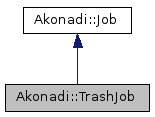akonadi
#include <trashjob.h>

Public Member Functions | |
| TrashJob (const Item &item, QObject *parent=0) | |
| TrashJob (const Item::List &items, QObject *parent=0) | |
| TrashJob (const Collection &collection, QObject *parent=0) | |
| void | deleteIfInTrash (bool enable) |
| Item::List | items () const |
| void | keepTrashInCollection (bool enable) |
| void | setTrashCollection (const Collection &trashcollection) |
 Public Member Functions inherited from Akonadi::Job Public Member Functions inherited from Akonadi::Job | |
| Job (QObject *parent=0) | |
| virtual | ~Job () |
| virtual QString | errorString () const |
| void | start () |
Protected Member Functions | |
| virtual void | doStart () |
 Protected Member Functions inherited from Akonadi::Job Protected Member Functions inherited from Akonadi::Job | |
| virtual bool | addSubjob (KJob *job) |
| virtual void | doHandleResponse (const QByteArray &tag, const QByteArray &data) |
| virtual bool | doKill () |
| void | emitWriteFinished () |
| virtual bool | removeSubjob (KJob *job) |
Additional Inherited Members | |
 Public Types inherited from Akonadi::Job Public Types inherited from Akonadi::Job | |
| enum | Error { ConnectionFailed = UserDefinedError, ProtocolVersionMismatch, UserCanceled, Unknown, UserError = UserDefinedError + 42 } |
| typedef QList< Job * > | List |
 Signals inherited from Akonadi::Job Signals inherited from Akonadi::Job | |
| void | aboutToStart (Akonadi::Job *job) |
| void | writeFinished (Akonadi::Job *job) |
 Protected Slots inherited from Akonadi::Job Protected Slots inherited from Akonadi::Job | |
| virtual void | slotResult (KJob *job) |
Detailed Description
Job that moves items/collection to trash.
This job marks the given entites as trash and moves them to a given trash collection, if available.
Priorities of trash collections are the following:
- keepTrashInCollection()
- setTrashCollection()
- configured collection in TrashSettings
- keep in collection if nothing is configured
If the item is already marked as trash, it will be deleted instead only if deleteIfInTrash() is set. The entity is marked as trash with the EntityDeletedAttribute.
The restore collection in the EntityDeletedAttribute is set the following way: -If entites are not moved to trash -> no restore collection -If collection is deleted -> also subentites get collection.parentCollection as restore collection -If multiple items are deleted -> all items get their parentCollection as restore collection
Example:
- Since
- 4.8
Definition at line 66 of file trashjob.h.
Constructor & Destructor Documentation
|
explicit |
Creates a new trash job that marks item as trash, and moves it to the configured trash collection.
If keepTrashInCollection is set, the item will not be moved to the configured trash collection.
- Parameters
-
item The item to mark as trash. parent The parent object.
Definition at line 296 of file trashjob.cpp.
|
explicit |
Creates a new trash job that marks all items in the list items as trash, and moves it to the configured trash collection.
The items can be in different collections/resources and will still be moved to the correct trash colleciton.
If keepTrashInCollection is set, the item will not be moved to the configured trash collection.
- Parameters
-
items The items to mark as trash. parent The parent object.
Definition at line 303 of file trashjob.cpp.
|
explicit |
Creates a new trash job that marks collection as trash, and moves it to the configured trash collection.
The subentities of the collection are also marked as trash.
If keepTrashInCollection is set, the item will not be moved to the configured trash collection.
- Parameters
-
collection The collection to mark as trash. parent The parent object.
Definition at line 310 of file trashjob.cpp.
Member Function Documentation
| void TrashJob::deleteIfInTrash | ( | bool | enable | ) |
Delete Items which are already in trash, instead of ignoring them.
Definition at line 339 of file trashjob.cpp.
|
protectedvirtual |
This method must be reimplemented in the concrete jobs.
It will be called after the job has been started and a connection to the Akonadi backend has been established.
Implements Akonadi::Job.
Definition at line 345 of file trashjob.cpp.
| void TrashJob::keepTrashInCollection | ( | bool | enable | ) |
Ignore configured Trash collections and keep all items local.
Definition at line 333 of file trashjob.cpp.
| void TrashJob::setTrashCollection | ( | const Collection & | trashcollection | ) |
Moves all entities to the give collection.
Definition at line 327 of file trashjob.cpp.
The documentation for this class was generated from the following files:
Documentation copyright © 1996-2014 The KDE developers.
Generated on Tue Oct 14 2014 23:00:29 by doxygen 1.8.7 written by Dimitri van Heesch, © 1997-2006
KDE's Doxygen guidelines are available online.
 KDE API Reference
KDE API Reference